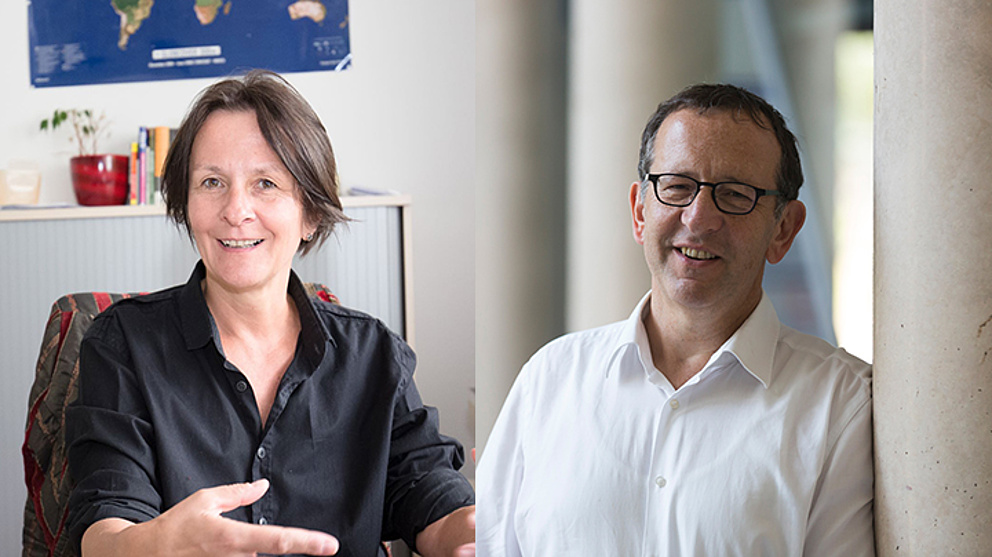

Contact
Press, Communications and Marketing
Tel.: +49 228 833-144
Fax: +49 228 833-441
presse[at]avh.de
Professor Markus Antonietti, Director of the Colloid Chemistry Department at the Max Planck Institute of Colloids and Interfaces in Potsdam has hosted a number of Humboldt fellows over the years. For Professor Almut Arneth from the Institute of Geography and Geoecology and head of department at the Institute of Atmospheric Environmental Research - both part of the Karlsruhe Institute of Technology (KIT), this undertaking is a premiere: She herself was once a Humboldt Research Fellow, but she has not yet been a host. Both applied to be scouts for the Henriette Herz Scouting Programme and convinced the selection committee that they were right for the job. Being scouts for the programme, they can now select up to three researchers to be granted a fellowship directly. The first fellowship is to go to a woman researcher. The criteria are the same as the criteria for excellence that apply to the Humboldt Research Fellowship. In the Henriette Herz Scouting Programme however an evaluation is conducted only after the fellowship has come to an end. We spoke with both scouts about this new approach.
Humboldt Foundation: What opportunities do you think the new scouting programme offers?
Almut Arneth: I applied to be a scout for several reasons but primarily because I constantly find that diversity (regardless of whether it pertains to gender, country or field of study) in research generates an incredible amount of added value. Without a doubt, this is because I conduct work in a field where research simply wouldn’t function without the sharing of ideas and information between disciplines. Moreover, the opportunity to welcome more scientists into my team for a while as guest researchers was very appealing. On the one hand, to hopefully create a springboard for other careers and, on the other, because we too can learn a lot from the Humboldtians. And lastly, I naturally hope that long-term collaboration also develops out of these research stays.
Markus Antonietti: I find it fascinating that the Henriette Herz Programme offers the opportunity to attract interesting researchers who would otherwise fall through the cracks. What I’m talking about here also includes researchers who are taking what we call the “second chance” path to earning a degree, who in many cases started a family at an early age and whose academic career hasn’t followed a straight line. Not to forget candidates who don’t come from a middle-class family and whose social backgrounds are more complicated. This combination of perhaps average grades in school but a high level of survival intelligence and a strong passion for science is something I consider to be very valuable.

Humboldt Foundation: What role does diversity play for you when selecting individuals to receive a fellowship?
Markus Antonietti: For me, diversity also means cultural and social diversity. Science really should be allowed to draw from the potential offered by all humans. Please don’t misunderstand me here: Gender diversity is very important but it often leads to a “linearisation of one’s career” which then has a socially discriminatory effect, particularly in the Second World with its rather impermeable social systems. What I mean here is that with gender diversity you do have more women in the system but they have followed the same educational trajectory that has been required of men in the science field to date. Two of my most creative colleagues first learned a technical occupation and had to go back to school and earn qualification to enter university before they became an “international star” in research. I can reach these kinds of talented individuals through the Henriette Herz Programme because it places its confidence in me as a scout. I can bring potential fellows into the programme and the success of this decision isn’t evaluated until a later date.
Humboldt Foundation: Professor Arneth, what do you think of the requirement that the first researcher you recommend should be a woman?
Almut Arneth: I think it’s very good. Although I’ve always been somewhat sceptical of “quota systems”, it appears that it’s not possible to get more women into the system without such arrangements. Actually, I would like to award all three openings to women. We’ll see if it works out that way.
Humboldt Foundation: How are you going to make this known among postdocs who have no idea what the Humboldt Foundation is?
Almut Arneth: I’m going to take various approaches. Of course, I’m going start by putting my own network into motion. But I’ve additionally publicised the Henriette Herz Programme offer and spread the word about it through a variety of channels, together with the invitation to contact me with a short “application”. I’m already excited to see what turns up in my inbox.
Humboldt Foundation: Professor Antonietti, what do you hope will come out of this programme for your research group? And conversely, what advantages does the programme offer for the fellows who are selected?
Markus Antonietti: Individuals who are sponsored by the Alexander von Humboldt Foundation have always been highlights in my guest programme and have contributed to the success of the Max Planck Institute of Colloids and Interfaces. On the other hand, we’ve also always been able to support the careers of our guests through top-quality publications and by helping build research profiles. More than two-thirds of our guest researchers during the last 25 years now hold professorships and senior positions - around the world. And these individuals continue to enrich scientific and academic exchange and the “Humboldt Family”. And now, if Henriette Herz Fellows were to make the Humboldt Family and the scientific community in their own countries even more diverse, what a success that would be!
updated on 9 April 2021
